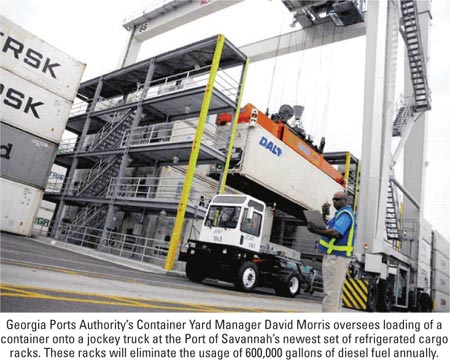Doug J. Marchand, the Georgia Ports Authority’s (GPA) Executive Director, announced today at its board meeting that the GPA has completed the construction of 34 electrified refrigerated racks that will eliminate the use of 600,000 gallons of diesel fuel annually. Just last year, the GPA completed the electrification of its ship-to-shore cranes, reducing diesel fuel consumption by 1.5 million gallons per year.
“The completion of our refrigerated cargo racks has allowed the GPA to take 14 diesel-powered generators off-line, reduce diesel consumption and continue our ongoing commitment to make substantial environmental improvements,” said Marchand. “Reducing consumption and emissions is a powerful combination in our ongoing mission to be good stewards of the environment.”
The GPA now has a total of 950 slots for refrigerated cargo to further support strong agricultural, poultry and citrus exports. In the past five years, the export of poultry and citrus has increased 116%, or an additional 68,311 twenty-foot equivalent unit (TEU) containers. GPA has plans to build additional capacity for refrigerated cargo. “The completion of this phase of the new cargo racks provides increased capacity and efficiencies for our refrigerated cargo customers while reducing the release of particulate matter and dependence on foreign fuel.”

Additionally, Marchand said, the Authority has recently replaced 15 aging cargo trucks with Tier 3 units that emit 57% less nitrogen oxide and more than 40% less particulate matter. Just last month, the GPA received a $250,000 award to retrofit GPA-owned equipment with devices that reduce air emissions. The engine exhaust enhancements will include diesel oxidation catalysts and crankcase filtration systems installed on 80 units of GPA’s container handling equipment.
“These equipment upgrades will reduce diesel emissions by 25%,” said GPA’s Chief Operating Officer Curtis Foltz. “Further, the retrofits along with GPA’s recent switch to ultra-low-sulfur diesel (ULSD) fuel will decrease emissions by a total of 34% for this equipment.”









